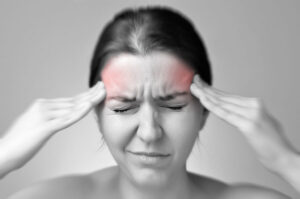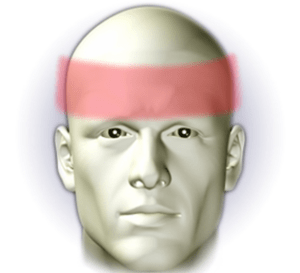Contents
What is Tension Headache?

Tension headache is a type of headache that can happen when your body experiences a lot of stress. It is the pain around your forehead or at the back of your head. It usually lasts from several hours to a few days. This happens mostly when a person is in his or her adolescence or in their thirties. This type of headache is not related to other diseases.
Typically a person who has experienced a tension-type headache may feel it come on suddenly lasting anywhere between fifteen minutes up to several days at a time. However, some people have said that their pain lasts weeks or months at a time which would be a chronic tension-type headache.
Types of Tension Headache
Researchers have classified tension headaches into types so that there can be better analysis and diagnosis of them. There are basically two types of tension headache such as:
Episodic Tension Headache

Episodic tension headaches can last from 30 minutes to a day and they commonly occur once or twice in the course of a month. These are very painful so it’s important to treat them early on before they become chronic. There are two types of Episodic-tension Headache:
- Frequent episodic tension-type headache: It happens on average of one per week. Headaches last between 30 minutes to 14 days, with or without sensitivity to light and sound but no nausea or vomiting.
- Infrequent episodic tension-type headache: It happens on average of 1 episode per month. Headaches may last from 30 minutes to 7 days. There may also be sensitivity to light or sound but no nausea or vomiting.
Chronic Tension Headache

Chronic tension-type headache is when you have 15 days with some sort of pain per month for more than three months. These are very painful. In fact, nearly 12% of the population suffers from chronic tension-type headaches. The pain intensity can range from mild/dull up until severe. You will likely experience some level of daily variation in terms of severity as well as length. This includes having more frequent headaches during certain days in your cycle (menstrual period). There may also be tenderness around the head, neck, shoulders, and upper back. So if you’re one of those millions, keep reading for some ways on how to deal with it.
Symptoms of Tension Headache
It’s important to listen to your body and be aware of how it feels if you’re experiencing tension headaches. These are some of the symptoms of tension headache that you can see :
Numbness
Some people start to feel numb in areas of their face, arms, and legs.
Dizziness

Dizziness is common with this kind of headache because it can cause you to not be able to walk properly or even sit still which causes the tension headaches symptoms to worsen.
Stiffness in Neck And Shoulders
The pain spreads across your forehead leaving a stiff neck and shoulders behind when you wake up feeling like there was no rest at all during the sleep time period.
Facing Trouble in Focusing
Trouble focusing is a symptom of tension headache. It means you face a lot of trouble in focus on your work, either in-office or at home from stress or overwork.
Getting Irritated
You start feeling irritated and anger easily when you face trouble focusing. It is a symptom that follows the headache and irritability stages.
Facing Trouble in Sleeping

You may find it difficult to sleep since your head starts hurting badly, or sometimes it becomes hard for you to even take rest due to neck pain.
Causes of Tension Headache
There are several factors that could cause people to experience tension headaches as well as other types such as migraine or cluster headaches. These are some trigger points that can cause tension headache such as:
Stress
Sometimes tension headaches get triggered by stress, Anxiety from school, work, or family issues. Depression can also cause tension headaches.
Aches or Pains

Tension headache is usually caused by muscle contractions that happen when you are stressed out, tired, or anxious. Sometimes the pain spreads across your forehead and to your temples. Some people even feel it in their jaws (jaw clenching).
Fatigue
Being fatigued can trigger a tension headache. When you are extremely tired either due to sleep deprivation or lack of physical activity it is likely that your body will go into “stress mode”.
Light Sensitivity
Light sensitivity makes it hard for people with this kind of headache to function normally during normal daylight hours like at school, work, etc.
Sensitivity To Noise
Loud sounds such as music videos, tv shows become unbearable so people who suffer from. This can cause them to suffer from tension headaches.
Eye Strain

If you work on a computer all day long or if your job requires staring at the screen for most of the time, try to take breaks and look away from it every once in a while. Eye strain caused by this can lead to a major problem of Tension Headache.
Low Iron Levels
If you suffer from tension headaches, it’s possible that low iron levels are the cause of them. Make sure to get your blood tested if this is something you’ve been experiencing lately.
Lack of Sleep
People with insomnia often have tension-type headaches because they don’t manage their stress well enough or simply can’t sleep at night due to racing thoughts in their heads.
Skipping Meals
Hungry people tend to be more irritable which leads to an increase in headache frequency over time. Always make sure not to go too long without eating anything healthy.
Increasing age
In increasing age, tension headache symptoms tend to worsen. Tension headaches can occur at any age but people with average lifestyles are more likely affected by them over time.
When Should You Visit A Doctor?

If you are suffering from a severe headache, you should visit a doctor for a diagnosis. Moreover, if the headache is accompanied by other symptoms such as vomiting or fever, it’s time to see your health care provider immediately.
Doctors or health professionals usually diagnose the condition by asking about your medical history and lifestyle. He or she will enquire about your symptoms. They will ask you certain questions such as
- Do you feel constant pain in your head?
- Does the pain get worse when there is a change in weather conditions?
- How long does it take to ease off after a full night’s sleep or a restful break at work?
- What makes it better and what worsens the symptoms of headache/pain?
- Have you noticed any change in your personality?
There are certain tests that a doctor conducts to rule out other conditions. These tests are:
Blood Test: To test the blood sugar levels.
CT Scan: To rule out brain tumors or any other major health problems in your head, neck, and/or shoulders.
Electrocardiogram Test (EKG): To check for cardiovascular diseases such as hypertension, coronary artery disease, etc. along with early signs of a stroke or transient ischemic attack.
MRI or X-rays: To get a clear image of the inside of the head.
How Can You Treat Tension Headaches?
Sometimes Tension Headache is not considered to be a major problem and is treated as a normal ailment that can be treated at home. People do not take any medical support. However, there are some different treatment methods that are for the treatment of this ailment.
Medications

Sometimes doctors use medications to treat tension headaches. There are basically two types of medications as preventive and acute medications. You should be aware that over-the-counter medications like ibuprofen, acetaminophen, and aspirin can have a negative effect on the liver if they are used daily for more than a few weeks.
Acute medications include pain relievers (which are usually the first step to relieve pain), combination medications (as these can be more effective than single-ingredient pain relievers), triptans, and narcotics (for those who have episodic and migraine headaches)
Preventive medications These medications are to reduce the frequency and the severity of the episodes. These include Tricyclic antidepressants (used to prevent this tension headache), Anticonvulsants and muscle relaxants, and other antidepressants.
Counseling
The different method to treat tension headache is by using therapy. The main objective of the treatment is to resolve all sorts of stress that may be causing the problem. This method has been found more successful than other treatments in reducing or even eliminating headache pain.
Physiotherapy

Treatment focuses on relieving muscle tension and headaches while improving your overall quality of life through better sleep, exercise habits, diet, and relaxation techniques. You can try these simple physiotherapy exercises at home to reduce your migraine frequency.
- Neck stretches
- Backstretch
- Shoulder blade squeeze
- Upper back stretch
- Side bend Stretch
- Cervical Spine Rotation (twist)
- Frontal Fibre Technique (for brow)
How can you Prevent Tension Headaches?
By making small changes like these ones, you can reduce stress levels and lower the chances of getting tension headaches. The more healthy habits you build into your lifestyle, the better quality sleep you’ll be able to get as well. This will help tremendously with recovery times since without proper rest your body won’t have enough resources needed for repair. These are some of the preventive measures that you can follow:

- Take frequent mini-breaks: This will help stretch muscles that tighten up throughout the working hours which is one of the main causes that trigger tension headaches.
- Try relaxation techniques like meditation and yoga before going to bed every day until things improve for you.
- Start stretching. It is an easy way to release muscle tightness so try doing it after waking up or before going to bed every day if possible. You could also stretch during breaks at work when you get tired of sitting all day long! This will keep blood flowing through your veins preventing any build-up of pain-causing chemicals found in the brain.
- Drink caffeinated products such as coffee, tea and soda can trigger a headache. Try to avoid drinking them and replace them with decaffeinated drinks instead like green tea for example which has antioxidants that help reduce stress levels in the body.
- Make sure you drink lots of water throughout the day especially if it’s really hot outside to prevent dehydration which can lead to more pain.
- Get enough sleep because lack of sleep causes chronic tension-type headaches in the long run.
- Don’t skip breakfast or lunch when you’re on a diet. Always make sure not to go too long without eating anything healthy.
Conclusion
The next time you have a tension headache try out some of these tips in order to treat your symptoms! It is important not only to get rid of this type of headache but also to stop it before it gets worse so that permanent damage does not happen. If all else fails be sure to contact your doctor.
For more information, please contact MantraCare. Stress can have both physical and mental effects on the body, leading to negative consequences such as anxiety, depression, and even physical illnesses. If you have any queries regarding Online Stress Counseling experienced therapists at MantraCare can help: Book a trial Stress therapy session


